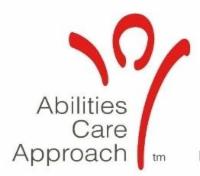By Gina Tucker-Roghi, Alexis Renfro, and Ali Vandeloo, Rock Creek of Ottawa, KS
Looking for opportunities to increase your community outreach and develop your outpatient program? Rock Creek of Ottawa is putting a new spin on the Abilities Care Approach. Ali Vandeloo, DOR, worked with Alexis Renfro, an OT and TEACHA (Therapy Expert on the Abilities Care Holistic Approach), to bring an abilities-based approach to dementia care to their community through outpatient programming. Ali and Alexis have broadened the scope of services at Rock Creek by promoting aging-in-place for individuals with early-stage dementia.
Our outpatient Abilities Care Approach programming incorporates the familiar aspects of the Abilities Care Approach with training, support and education for family caregivers to target the following clinical outcomes:
1) Increase caregiver self-efficacy through education on approaches and techniques to manage challenging behaviors
2) Prevent falls and injuries
3) Maintain meaningful relationships and engagement with family, friends, and the community
4) Maintain function, prevent functional decline and mitigate risk factors related to dementia
Since launching the pilot of this program, Rock Creek has provided outpatient services to eight individuals living with dementia in the community. One of our first clients was an individual with middle-stage dementia living with her husband in the community. We provided education and support for the caregiver to enhance the care he provided for his wife. Our interventions focused on maintaining a healthy routine, prevention and management of neuropsychiatric behaviors, prevention of falls and injuries, participation in meaningful activities, utilization of sensory strategies to improve engagement, and utilizing their authentic and meaningful context to personalize her care and experience. As a result of our services, he learned new approaches and was more confident in his ability to care for his wife.
Another client was an individual with early-stage dementia and depression. She was living home alone and had been a rehab patient at Rock Creek prior to discharging home. She received outpatient services post-discharge to help her integrate health-promoting behaviors and habits into her daily routines and was able to stay in her home and remain engaged in her community through activities with her church and volunteering.
An outpatient ACA program can help you achieve the following facility and community outcomes:
1) Create rapport and relationships with families in the community that may result in opportunities for future admissions for respite or long-term care services in your SNFs or Als
2) Increase community awareness of the scope of facility services throughout the continuum of care
3) Attract new therapists and grow your therapy department
4) Minimize the stigma of dementia and increase knowledge and understanding of members of your community who interact with individuals living with dementia
Here are a few tips if you are ready to get started:
1) Start with patients already under your care (patients discharged from post-acute to home or residents at your on-campus or affiliated ALFs).
2) Become familiar with the existing community resources for individuals living with dementia.
3) Network to get to know service providers for individuals with dementia who live in the community. Here are some examples:
a) Area Agency on Aging
b) Meals on Wheels
c) Geriatrician or dementia clinic
d) Alzheimer’s Association
e) Dementia caregiver support groups
f) Adult day health programs
If you are interested in giving Outpatient ACA a try, join our bi-weekly call of early adopters. We gather every two weeks on Wednesday at 9 a.m. PST. Our next meeting is April 20. Please email Gina Tucker-Roghi groghi@ensignservices.net to be added to the call invite.

